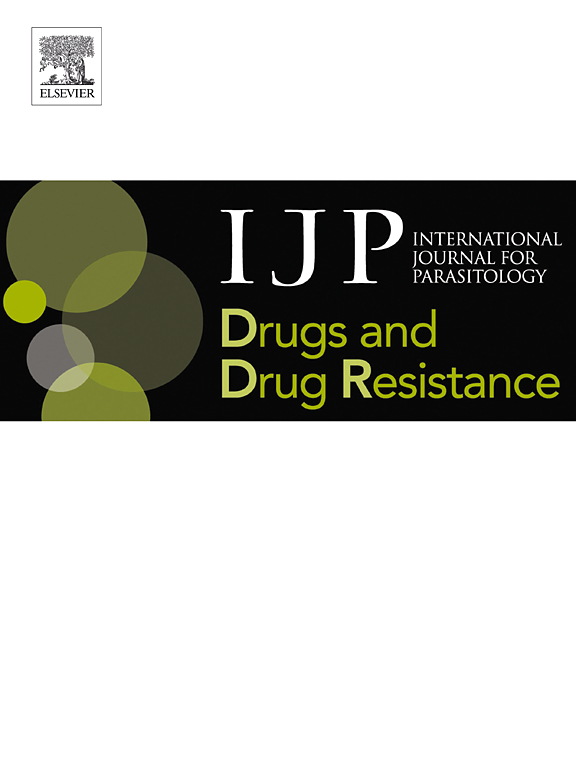疟原虫对顶质体翻译抑制剂的耐药性
IF 3.4
2区 医学
Q1 PARASITOLOGY
International Journal for Parasitology: Drugs and Drug Resistance
Pub Date : 2025-05-10
DOI:10.1016/j.ijpddr.2025.100597
引用次数: 0
摘要
耐药疟原虫的传播威胁着疟疾控制工作。因此,了解耐药机制对于实施有效的治疗和预防策略至关重要。由顶质体编码的原核样翻译机制是几种具有抗疟疾活性的抗生素的明显靶点。其中,强力霉素和克林霉素被广泛用于疟疾治疗和/或化学预防。然而,疟原虫对顶质体靶向抗生素耐药的机制以及这种耐药机制的演变在很大程度上仍然未知。在这篇综述中,我们总结了在实验室或临床环境中发现的对顶质体翻译抑制剂耐药的病例。我们强调了强力霉素耐药性的潜在进化途径,探讨了为什么对这些抗生素的耐药性在该领域仍然罕见,并评估了扩大它们在疟疾治疗和预防中的使用是否是一种可行的策略。本文章由计算机程序翻译,如有差异,请以英文原文为准。

Resistance to apicoplast translational inhibitors in Plasmodium
The spread of drug-resistant Plasmodium threatens malaria control efforts. Thus, understanding the mechanisms of resistance is crucial for implementing effective treatments and prevention strategies. The prokaryote-like translational machinery encoded by the apicoplast is the apparent target of several antibiotics with antimalarial activity. Among them, doxycycline and clindamycin are widely used for malaria treatment and/or chemoprophylaxis. However, the mechanisms underlying Plasmodium resistance to apicoplast-targeting antibiotics, and the evolution of such resistance mechanisms, remain largely unknown. In this review, we summarise reported cases of resistance to apicoplast translational inhibitors uncovered in either laboratory or clinical settings. We highlight the potential evolutionary pathway of doxycycline resistance, explore why resistance to these antibiotics remains rare in the field, and assess whether expanding their use in malaria treatment and prevention is a viable strategy.
求助全文
通过发布文献求助,成功后即可免费获取论文全文。
去求助
来源期刊

International Journal for Parasitology: Drugs and Drug Resistance
PARASITOLOGY-PHARMACOLOGY & PHARMACY
CiteScore
7.90
自引率
7.50%
发文量
31
审稿时长
48 days
期刊介绍:
The International Journal for Parasitology – Drugs and Drug Resistance is one of a series of specialist, open access journals launched by the International Journal for Parasitology. It publishes the results of original research in the area of anti-parasite drug identification, development and evaluation, and parasite drug resistance. The journal also covers research into natural products as anti-parasitic agents, and bioactive parasite products. Studies can be aimed at unicellular or multicellular parasites of human or veterinary importance.
 求助内容:
求助内容: 应助结果提醒方式:
应助结果提醒方式:


